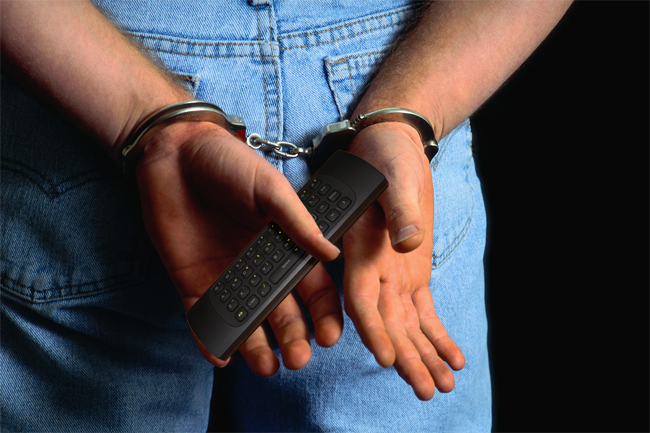
Tennessee lawmakers think that sharing a Netflix password is like stealing cable. Today, lawmakers in the state passed a new measure that criminalizes using a friend’s login for entertainment services like Netflix, Hulu Plus, or Rhapsody. All the bill needs now is the governor’s signature, and the AP reports that Gov. Bill Haslam is expected to sign the bill.
“I don’t know enough about that legislation, but if it’s combating that issue [music piracy], I would be in favor of it,” Haslam said. The RIAA and recording industry have a strong presence in Nashville.
Once signed, if you are caught using an entertainment service that is not under your name, you could be heavily fined, charged with a misdemeanor and sent to jail, or charged with a felony, even if the password was given to you willingly. That’s right, a felony. While the legislation is mainly aimed at those who sell passwords in bulk, the bills sponsors admit that its language is so vague that it could be used to target small offenders like friends who share passwords or groups of kids in college dorm rooms.
“What becomes not legal is if you send your user name and password to all your friends so they can get free subscriptions,” said the bill’s House sponsor, Rep. Gerald McCormick.
All it takes is a call from one of these services and you could be charged with a felony. The legislation was lobbied by the music recording industry and is a sort of 21st century addition to the cable stealing laws that exist today. It adds “entertainment subscription service” to the list of services protected by law. The question is, do services like Netflix or Rhapsody need laws like this to protect them?
Stealing cable
While I am no expert on the subject, detecting cable theft was not an easy task back when these laws were first implemented. Feasibly, someone could buy a splitter and share his or her connection with a neighbor or an apartment complex could wire its tenants up for a while without being noticed. Black boxes, which descramble television signals without authorization, are another way to accomplish theft (or willing sharing) of a neighbor’s service. The most common ways cable thieves and sharers have been identified are through technicians noticing the hookup or a neighbor reporting the problem or poor service. More sophisticated, remote means of detection do exist.
A Massachusetts cable theft document explains some of the reasons this legislation was enacted, most of which sound like a lobbying effort by the cable industry: “added service calls, additional system maintenance and lost revenue can increase everyone’s cable rates. Indeed, theft of cable service costs the cable industry an estimated 5.1 billion dollars per year! This increases the cable operator’s cost of doing business and may increase your rates. Consequently, the honest customer ends up paying for those who illegally receive services for free.”
$5.1 billion dollars per year is, of course, a number that the cable industry came up with, but theft of things like cable is impossible to accurately put into dollars. We would have to know how many of those stealing their cable would actually purchase it if they weren’t sharing or stealing. Still, some money has likely been lost due to cable thieves and overly-friendly neighbors.
Sharing Netflix and other passworded services
So what is so different about sharing Netflix, Rhapsody, and other “entertainment services” passwords? Well, unlike cable companies back in the day (they may be able to detect theft better now that cable is digital), entertainment services like Netflix know exactly when you log into their Internet service, what you watch and listen to, who your ISP is, and when you log off, among other things. They know what device you’re logged into and they know when you log in from two or more accounts simultaneously. In the case of Netflix specifically, it allows users to log in and watch from a myriad of devices, many of which are mobile. However, it also limits usage where it deems necessary.
I have firsthand experience with this. When I moved several hours away from a former roommate late last year, I still had his Netflix account connected to my Nintendo Wii. However, due to inter-device policy or our physical distance, Netflix limited usage of my former roommate’s Xbox and my Wii to one device at a time. If I started watching a show, it would kick him off. Likewise, if he began watching a show, I would be kicked off the service. This is one example of an entertainment services company dealing with these problems itself. With no law on the books, Netflix has kindly persuaded me to pay for my own streaming account; however, under a law like this, I would not be paying Netflix $8 a month and I could be in jail.
If any entertainment services company believes a customer is stealing or abusing its service, then that action is almost certainly a breach of the “terms and conditions” that customer agreed to when he or she signed up. Why can’t Rhapsody or Netflix simply warn and boot off offending users on their own? They have the power to remove access to those stealing or leeching service as well by requiring a user to change his or her password or forcing a user onto a “family plan” of sorts.
What else should be illegal?
If state, local, or federal governments would like to continue wasting our tax dollars on frivolous items industries should deal with themselves, I have a few more suggestions for them.
Smartphone tethering: Tethering your smartphone to your computer to share your Internet connection without paying your wireless carrier an extra $10 bucks isn’t illegal, but it could be! Verizon and AT&T are already dealing with this issue by sending warnings to users and charging them extra for tethering, but why make them do the hard work? Just have them call up law enforcement with a list of 25,000 names. The law can deal with it for them.
Sneaking into a movie: Every movie you sneak into is potential lost revenue for the theater, and technically, it is already illegal. While most theaters post ticket takers and guards, removing offending “trespassers” themselves, why force the theater to do this? Instead, the police should have separate units assigned to guard movie theaters from cheapsters. Almost everyone has sneaked into a movie at least once. They should all be in jail, right?
Making a mix CD for a friend: Now, this is pretty 90s, I know, but why didn’t the government get more involved in the dark art of mixes? After all, the RIAA has certainly shown that it doesn’t want friends to share music with their friends. While we argue that things like sharing and making mixes could promote more music interest from all parties involved–which would result in future album purchases and possibly lead to a myriad of related sales opportunities, including concerts–it isn’t up to us. If we’re to only focus on the negative impacts of music and file sharing, then a big government crackdown on blank CDs should have happened a while ago.
Enough already
The U.S. federal government has a lot on its plate already and State governments are failing to meet their budgets by the dozen. Why are we pandering to fears by a few lobbying industries over issues that appear to be fairly easy for entertainment services companies to take care of themselves? Cable theft and Internet services are two different beasts, but neither need government regulation. Users pay for these services. If Comcast or Netflix deem them bad customers, then they are welcome to kick them off. It doesn’t need it to be a felony.
(We contacted Netflix with several questions about how they handle issues like these, but did not receive a response by press time.)


